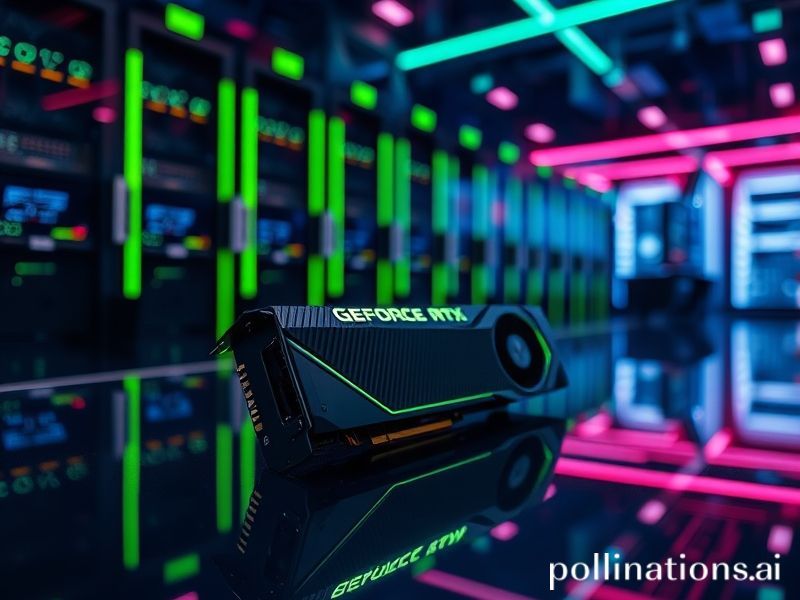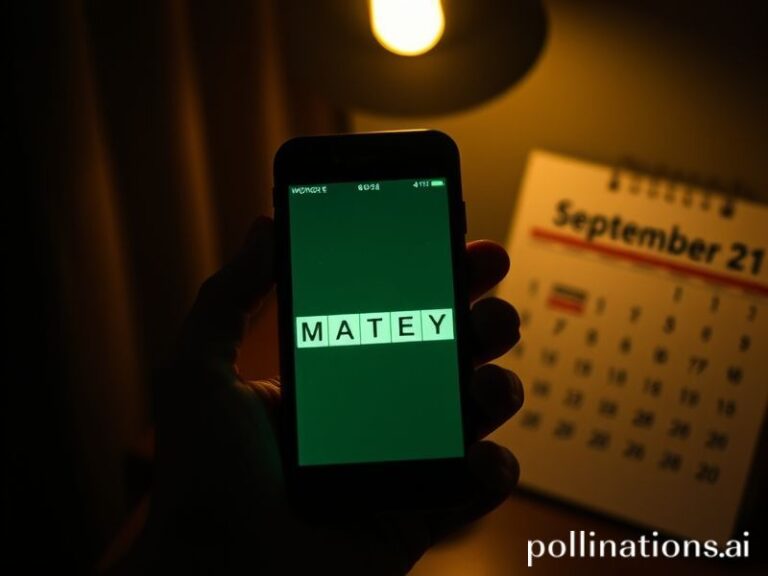Nvidia: The Global Silicon Cartel Now Running Your Dictatorship, Democracy, and TikTok Filter
Nvidia: The Green Giant Making the World’s Dictators and Democracies Equally Dependent
by Our Correspondent in a Café Where the Wi-Fi Is Faster Than the Justice System
If Silicon Valley had a Godfather, it would wear a leather jacket, speak with a mild Taiwanese-American accent, and answer to “Jensen.” Nvidia, the company that started life in 1993 as a maker of graphics cards for teenage boys who still lived with their mothers, has quietly become the planet’s most indispensable arms dealer—only the weapons are GPUs, the battlefield is everywhere from Lagos to Lhasa, and the collateral damage is measured in carbon footprints and democratic norms.
The numbers are so cartoonish they feel Photoshopped. A 200 % surge in quarterly revenue, a market cap brushing three trillion dollars, and a stock chart that looks like the ECG of someone mainlining espresso. To put it in perspective, Nvidia is now worth more than the entire German stock index, which is ironic because Germany just announced a €1.5 billion plan to reduce dependence on… Nvidia chips. Somewhere in Berlin, a bureaucrat is Googling “sovereign AI” between bites of schnitzel and existential dread.
The geopolitical beauty contest is equally absurd. Washington bans the export of Nvidia’s top-tier A100 and H100 chips to China, so Beijing responds by instructing its own smugglers to stuff suitcases full of GPUs like it’s Prohibition-era gin. Meanwhile, Saudi Arabia’s Public Investment Fund—fresh from rehabilitating its image with LIV golf and blood money—is ordering $40 billion worth of Nvidia gear to build a desert Silicon Oasis where the only mirage bigger than the skyline is the notion of ethical AI.
Europe, never one to miss the chance to regulate itself into irrelevance, is drafting the AI Act, a 144-page document that reads like a group-therapy session for bureaucrats who’ve just discovered Python. The fine print effectively mandates that any company using Nvidia chips must also hire a full-time philosopher to explain why the algorithm thinks you’re a terrorist. Parisian startups are already drafting job postings: “Must have PhD in ethics and be able to parallelize resentment across 10,000 CUDA cores.”
Down in the Global South, the story is darker still. Congolese cobalt miners—many of them children—continue to hack at the geological misery that eventually becomes Nvidia’s high-end circuitry. Their daily wage wouldn’t buy a single millisecond of compute time on the very GPUs their labor enables. Somewhere in a San Francisco loft, a founder training a large language model to write empathy-laden tweets about social justice pauses to sip an oat-milk latte and congratulate himself on disrupting colonialism.
And then there’s climate change, the unwelcome plus-one at every tech party. Training a single large model can emit as much CO₂ as five average cars over their entire lifetimes. The industry’s preferred solution? Buy more Nvidia chips to simulate better weather models so we can predict the exact moment our coastal data centers will drown. It’s like hiring an arsonist as your fire marshal, but with better marketing.
Still, no one can look away. Japan is subsidizing domestic fabs to keep Nvidia supplied, South Korea’s SK Hynix is running 24-hour K-drama marathons in its break rooms to keep workers awake, and even cash-strapped Argentina is considering exporting beef futures for Blackwell GPUs. Because in the twenty-first-century gold rush, the pickaxes are made of silicon, and the miners speak every language except the one that says “enough.”
Conclusion: Humanity has, with typical flair, engineered a form of mutually assured computation. Dictators need Nvidia to monitor their citizens, democracies need it to monitor the dictators, and the rest of us need it to generate cat videos in 8K. The company’s logo may be a green eye, but the real symbol is Ouroboros—the snake eating its own tail. The only remaining question is whether the tail tastes like cobalt, or just like chicken.







